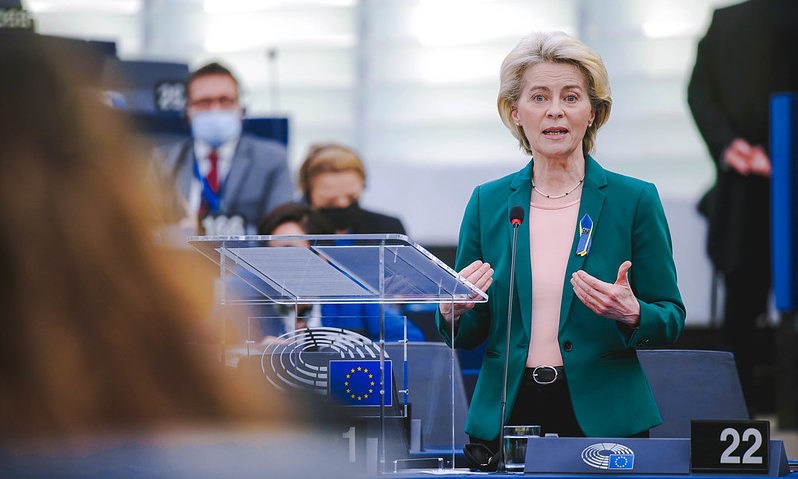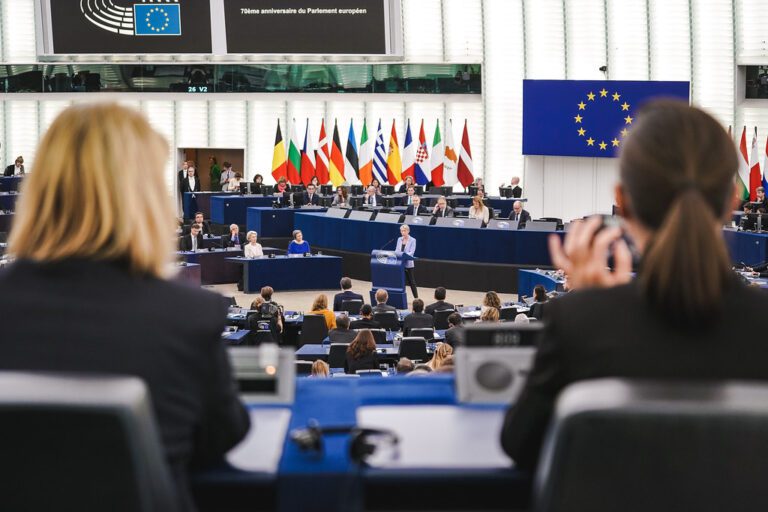
This article originally appeared in 9DashLine.
The recent salvo of tit-for-tat sanctions between China and the EU over Xinjiang has seemingly brought bilateral relations to the brink. Yet, one would not know by looking at the readout of the recent call between Germany’s Angela Merkel and China’s Xi Jinping, or the trilateral China-France-Germany climate summit. No mention of the sanctions was to be found, nor could a tenser tone be detected.
Similarly, the EU’s leadership duo Charles Michel and Ursula von der Leyen did not make any statement on the unprecedented escalation. However, even if there appears to be strong support for continuing the status quo, below the surface things appear to be in a state of flux.
Misguided Search for Loopholes
In the EU, especially the Western capitals, there has long been a curious obsession with identifying Chinese “Trojan horses” — individual member states — through whom China could promote its interests within the EU. The usual suspects have been the 17+1 format of cooperation between China and CEE, or individual EU member states like Hungary, Greece, or Portugal.
Indeed, in many cases, some member states have championed Chinese interests by attempting to block or water down EU criticism of China’s actions. This has often proved an easy game to play as currying favour with Beijing has come at a low political cost. In the latest round of sanctions, Hungary was perhaps the most effective player — it was lauded by China for its criticism of the move, all the while voting in favour of the sanctions in Brussels. Just a few weeks later, Hungary blocked an EU statement on Hong Kong, an issue where stakes were arguably lower and the issue more of symbolic importance.
However, in the larger perspective of Chinese geostrategic interests, what matters most for Beijing is the steadfast support for ‘business as usual’ in Berlin, Paris, and Brussels. China is still essentially seen as a troubled partner with whom cooperation can be pursued in some areas like climate mitigation while fencing them out from more conflictual aspects of the relationship such as Chinese disinformation or financing of ‘dirty’ projects in the European neighbourhood. Even if the ‘partner, competitor, rival’ trinity has become somewhat of a tired catchphrase, it aptly characterises the European approach.
Changing Views of China
Yet, in the long run, efforts to compartmentalise EU-China relations are folly. More than anything else, this is due to China’s unwillingness to accept such an arrangement, rather than the EU’s inability to combine the different aspects of relations into a coherent policy. With pragmatism apparently being replaced by ideological zeal in Chinese foreign relations, it seems that Beijing is willing to sacrifice strategic gains in some areas, including the successful ratification of the Comprehensive Agreement on Investments (CAI), in favour of the aggressive defence of its increasingly repressive domestic policies in Xinjiang and elsewhere.
Meanwhile, a pro-China policy is becoming harder for EU member states to maintain in the face of the growing popular discontent. China’s aggressive ‘wolf warrior’ diplomacy throughout the COVID-19 pandemic has severely hit China’s image. Beijing has, for a long time, successfully depended on the support of business and political elites, who have vested interests in continuing the partnership with China. However, with public demand for change growing, this policy seems untenable in the long run.
Despite growing evidence of the challenges posed by China on a range of issues including the economy, values, and security, there is still policy inertia in the EU capitals. This has been most prominently illustrated by the rushed conclusion of the CAI agreement after a year of aggressive Chinese diplomacy towards the EU, and again by the muted reaction to Chinese countersanctions. However, this inertia can also lead to unintended consequences. A notable example is the nascent backlash towards China that is being taken up as a political tool by radical populist forces in Europe; at a minimum, this is likely to shift the mainstream discourse towards a more assertive posture vis-à-vis Beijing.
Importantly, Chinese sanctions are a potent confirmation that China presents a challenge to the values of democratic societies in Europe. The sanctions on researchers as well as the elevated attacks from Chinese Embassies on European journalists and analysts from France to Sweden are demonstrating that Beijing is, inevitably, getting involved in the domestic policies of Western democracies.
The argument has long been that, unlike Russian interference, China does not seek to destabilise democracies or influence domestic politics in other countries. However, even if China’s involvement largely touches upon essentially Chinese “domestic” issues (Taiwan, Hong Kong, or Xinjiang), their growing prominence in Western public opinion and political circles is resulting in more forceful and wider Chinese interference in public debate in Europe. This, combined with the growing Chinese penchant for employing disinformation make Beijing’s long-term efforts to present itself as a responsible power and a champion for a stronger EU ring hollow.
Transatlantic Axis
China is also becoming a prominent topic on the agenda between the EU and US, as exemplified by the recent concerted sanctions and the intensified consultations on China (with formal dialogue on China) which started during the Trump administration. Yet, this process is not as straightforward as it may seem.
China, for its part, continues to wholeheartedly support the EU’s goal of “strategic autonomy” in every interaction with European leaders, the meaning of which is singular from the Chinese perspective — not ganging up with the US in its policies. This negative definition of “strategic autonomy” as autonomy from the US debate also finds echoes in Europe.
Indeed, the EU will hardly adopt Washington’s full-spectral focus on China and make confronting Beijing’s geopolitical goals a cornerstone of its global strategy. The EU’s longstanding inability to play hard with Russia, which, unlike China, presents a more direct military threat to some EU members, is a testament to that.
It remains to be seen whether China will be successful in exploiting the transatlantic divisions, which will inevitably occur — for its gain. For example, Beijing’s apparent willingness to sacrifice the CAI, which would structurally commit the EU to deepen interdependence with China even while the US continues to pursue some form of decoupling, shows that China may fail to do that. On the contrary, growing Chinese assertiveness will bring the US and EU closer together.
The Way Forward
Ultimately, long-term trends within the EU do not favour Chinese interests. The key autumn elections in Germany may bring an end to the Merkel-era “Wandel durch Handel” (change through trade) paradigm and reshape China’s ties with its most ardent supporter in the EU away from the primacy of economic considerations. The Greens, who are set to play a significant role after the elections, are calling for a “whole of government” approach towards China, developing closer relations with democracies in Asia, and working more towards a European approach towards China.
At the same time, many Central and Eastern European countries like the Baltic states or Romania are reconsidering their ties with Beijing, and are now more willing to approach China within 27+1 rather than the 17+1 format. The time might just be right to revisit the effort to shape a truly European approach.
Moreover, the EU’s willingness to criticise China more forcefully on its human rights violations and other issues will only lead to stronger reactions from China, leading to vicious cycles such as the recent sanctions flare-up. This will make it politically difficult (but not impossible) to support further engagement with China, as evidenced by the unwillingness of the parties in the European parliament to take up the issue of CAI after Chinese sanctions.
Meanwhile, the EU is set to further augment its already potent toolbox of defensive measures, designed to fix the asymmetry in the openness of the European and Chinese markets. This may involve efforts to limit access of the Chinese companies to the lucrative European public procurement market, just as European companies are largely cut out from China’s market.
Business interests of European conglomerates in China will of course not disappear, and their voice will continue to be heard in the corridors of power. Facing growing scrutiny over its domestic human rights situation and foreign policy activities in Europe, Beijing may try to instrumentalise European businesses even more in lobbying for China-friendly policies, making sure they understand that their success in China is at Beijing’s mercy.
Ultimately, the more hawkish voices will be unsatisfied with the EU’s policy on China, which will continue to tread a fine path to avoid completely upsetting the relationship with Beijing. Nonetheless, the times are slowly, but inevitably, changing in Europe and Beijing would be wise to adapt to them, lest it finds its traditional toolbox of co-option and coercion outdated.
Written by
Filip Šebok
Filip Šebok is an analyst at CEIAS. He was a China Research Fellow and Project Manager at the Association for International Affairs (AMO) in Prague, Czech Republic.


